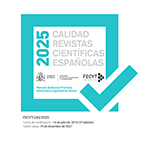Travel literature in Primary Education: a didactic tool for female empowerment and environmental awareness
Abstract
This article proposes the use of children's and young people's travel novels as a useful resource within the framework of Royal Decree 157/2022, of 1 March, which establishes the organisation and minimum teaching requirements for Primary Education, specifically, the exit profile of students and their competence approach. Based on an analysis of the curricular elements decreed, two recent works of the aforementioned sub-genre are studied, both by the award-winning writer for children and young people Andrea Maceiras Lafuente: A folla azul and Alma de elefante. The journeys of their heroines, both set in the destruction of two jungles, made the novels they feature winners of the Merlin Award 2020 and the Anaya Award 2022, respectively. The study of the works carried out stars from the sub-genre of travel literature and a specific narrative structure, that of the quest, to docus on the type of protagonists who lead these stories, in this case, two girls who embody some of the main values set by the Sustainable Development Goals to which the Exist Profile for Primary School pupils is largely intended to respond. The aim of this study is to validate the isea that Literature and reading are the appropriate instruments for the education proposed by the LOMLOE in a transversal competence approach.
Downloads
Article download
License
In order to support the global exchange of knowledge, the journal Didáctica. Lengua y Literatura is allowing unrestricted access to its content as from its publication in this electronic edition, and as such it is an open-access journal. The originals published in this journal are the property of the Complutense University of Madrid and any reproduction thereof in full or in part must cite the source. All content is distributed under a Creative Commons Attribution 4.0 use and distribution licence (CC BY 4.0). This circumstance must be expressly stated in these terms where necessary. You can view the summary and the complete legal text of the licence.










